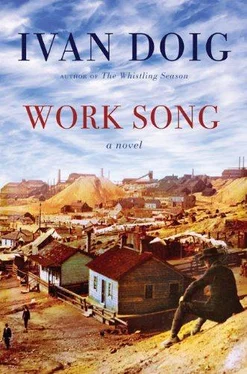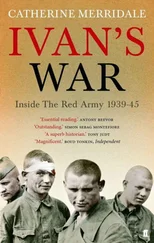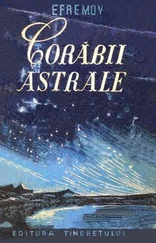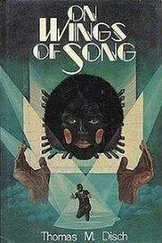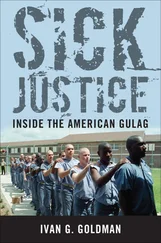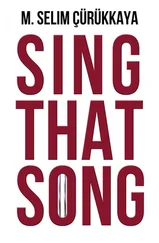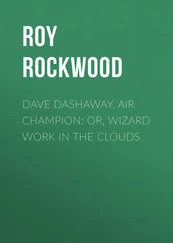AT SUPPER, Griff and Hoop were downcast and Grace was not serving up sympathy. “No blood in the streets, how disappointing. Jared Evans must be more sane than some I could mention.”
“He’d better have something up his sleeve,” Griff said.
THREE MORNINGS LATER, I rounded the corner of the library into a teeming streetful of miners and Sandison frowning down at them.
I worked my way through the crowd, dropping questions as I went. Sandison met me at the top of the steps, looking even more disgruntled than usual. He drew me aside behind a pillar, while the library staff and the miners gawked back and forth. “What do the knotheads say?” he pumped me without preliminary. “Have they quit fooling around and actually gone on strike this time?”
“Not as such,” I reported. “It’s another work action-just the morning shift, they told me.”
“How many more times is this going to happen?” he demanded, as if I were in charge of that.
Knowing Jared Evans, I put up my hands helplessly. “Doubtless as many as it takes. Wouldn’t you say it’s a tactic that goes back to Roman history, Sandy? You will recall the great delayer, Fabius Cunctator, who outgeneraled his foes with skirmishes that put off the climactic battle time after time. It appears to me that the union similarly is using these stoppages to wear on Anaconda’s nerves and-”
“They’re practicing on mine, I can tell you that much,” he disposed of my discourse. “Are we running a library or a union hall?” Scowling at his own question, he heaved himself around for another look at the packed street. I barely caught the words in his gust of exhalation: “Oh, hell, let them in, Morgan.”
FULL AS A CHURCH on Christmas, the library brimmed with activity, much of it mine as I sped from task to task. Sandison commanded from the mezzanine, on the lookout for anyone forgetful enough to spit on the sacred floor, and things seemed to be going well until midway through the morning, when he flagged me down with the news:
“Miss Runyon has gone home in a nervous fit, the excitement has been too much for her. You’ll have to take over the story hour.”
“Now? How? Whatever short notice is, this is less.”
“The tykes are on their way,” he overrode my protest. “You wouldn’t want to break their young hearts, would you?” Did the man actually have a sense of humor? I would have had to part that beard of his like a curtain to be sure. “Get yourself down there,” he ordered.
I raced to the basement, hoping against hope that the auditorium’s supply cabinet held some storybook that Miss Runyon had in reserve for emergencies such as this. Rummaging frantically, I came up with a dog-eared Mother Goose Tales. Well, it wasn’t Aesop, but it would have to do. I breathed easier; from my experience in the one-room school, even jaded fifth-graders eavesdropped keenly enough when those old nursery tales were read to the younger children.
Then I heard the thumps and scuffles on the stairs.
By the time the freckled heathens of the sixth grade spilled into the room, with Rab riding herd behind them in a harried way, I had given up on Mother Goose. More like a rough-dressed horde than a class, boys and girls alike threw themselves into chairs and looked me over. Who’s this gink? I heard the loud whispers. How come so much of him is mustache? Where’s Old Lady Bunion?
“Everyone, shush, or else,” Rab recited as if by rote, meanwhile shooing the final straggler in from the hallway. Pale as a chalk figure, Russian Famine slouched past her, sending me a prisoner’s gaze as he took the farthest seat of the last row.
His classmates ignored him but not one another, pinching, poking, prodding, and generally provoking disorder. How well I remembered it all. Grade six somehow transforms obedient schoolchildren into creatures with the bravado of bandits and the restlessness of overage Sunday schoolers. Rabrab herself had turned into a schoolyard Cleopatra at that time of life; the Marias Coulee sixth-grade boys went dizzy in her presence. Now I watched her brightly approaching me, while behind her a pugnosed boy and a redheaded girl swatted each other over the issue of elbow room. If Rab, with her battlefield experience, couldn’t command best behavior from this bunch, what chance did I have? The dismaying thought occurred to me that, in Butte, perhaps this was best behavior.
“Mr. Morgan, what a treat,” her velvet murmur greeted me as we stepped aside to confer. “My pupils don’t know how lucky they are.”
“I can see that. I was hoping for a second-grade choir of angels.”
Rab wrinkled her nose at her squirming tribe. “They’re somewhat worked up today.”
“I wonder why.”
“The Hill is a little excitable this morning,” she hedged, “but Jared is only doing what he thinks is necessary.”
“Maybe so. The question is, what am I to do with this mob of yours, Rab?”
“Anything you like, as long as it teaches first aid,” she said contradictorily. “That’s a must-we don’t want the school board on our necks.” She thought to add: “Nor, I imagine, Sam Sandison.”
I had forgotten the medical aspect. Seeing my blank look, Rab prompted: “Your Miss Runyon starts off with Florence Nightingale as a nurse in, oh, say the Crimean War, with shot and and shell whizzing everywhere, and somehow jumps from there to strapping one of the pupils up in bandages. Then, next story hour it is Florence Nightingale happening upon some awful accident in London, and-”
“I get the picture.”
There was nothing to be done but square myself up and advance to the stage of the auditorium. Restive in the seats below, the class eyed me like cub lions in the arena waiting for a Christian meal. So be it; I took off my suitcoat and tossed it to a surprised Rab, then rolled up my sleeves as if for a fight.
“Blood,” I said in a tone practically dripping with it.
The word did its work, for the moment at least. Two dozen sulky faces showed flickers of interest.
“Blood is red as fire, and thicker than rain,” I did not let up. “Blood percolates secretly all through us, from finger to toe. It outlines our family, whom we speak of as our own flesh and blood. When we are afraid, we feel our blood run cold, and when we are angry, we are hot-blooded. No other substance carries the magic of life so tirelessly.” As I talked on, I pressed a set of fingers to my wrist. “The heart beats in its mysterious way, day and night, so blood never sleeps.” I finished taking my pulse. “While I have been speaking, my heart has pumped blood sixty times. If it had stopped doing so, back there when I rolled up my sleeves to test it, by now I would stand before you dead.”
Several more heartbeats went by as my audience caught up with that. A litany of gasps, a lesser peal of nervous laughs. One girl crossed herself.
Before such attention wore off, I swept my listeners through the Greek suppositions of Hippocrates and Galen-that blood simply sloshed in us like water in a jug-to William Harvey’s discovery that the substance in fact goes around and around. “The circulatory system, as it is called, sends this miraculous fluid circling through us.” There is a glaze that comes over a class if too much of a topic is pressed on them at one time, and I could tell from a first few restless feet and territorial elbows that I was reaching that limit.
Folding my arms on my chest in thinking mode, I paced the stage. “Roll up your sleeves, everyone.” This was a gamble. Hardboiled boys and pouty girls among the group showed no inclination to do so. But Rab got on the job, patroling mercilessly, and soon enough I had a forest of naked arms in front of me.
“There is a superstition that your life can be read in the palm of your hand,” I began, “but really, it is written there on the underside of your wrist.” I bustled them through taking their own pulse, emphasizing that the underskin rhythm was actually the contractions of arteries as blood was pushed through by the pumping of the heart. As intended, even the most heedless twelve-year-old could not ignore the message of existence there just beneath a surface barely thicker than paper. “And,” I rounded off the arm lesson, “the blood that keeps us going has to find its way back to the heart to be pumped again. See the blue tracings between your wrist and elbow? Each of those is a vein. A word you have heard at home, am I right? Your fathers and perhaps your brothers descend into the body of the earth to find those streaks of ore. If you think about it, copper is the blood of Butte.”
Читать дальше
